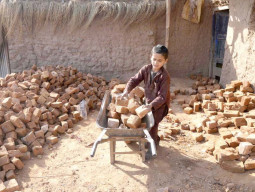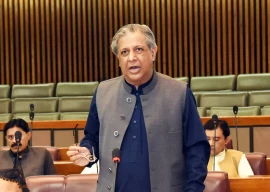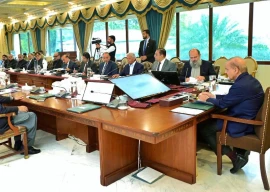
The New Year brought some good news related to legislation about children when the long awaited National Commission on the Rights of the Child (NCRC) Bill 2017 was passed by the National Assembly of Pakistan on February 01, 2017. Within the same week, the Sindh Assembly passed the Sindh Prohibition of Corporal Punishment Act 2017 and a week earlier the Sindh Prevention of Child Labour Act 2017. These are all great developments and something to cheer up about for the child rights activists and civil society of Pakistan and I must congratulate the National Assembly and the Sindh Assembly for these child-friendly legislation. At the same time however; everyone should be cognisant of the fact that there is a long way to go to see these laws having any impact on the state of child rights in the country. We have many excellent laws about child rights on the statute books for years but when it comes to the implementation of these laws, we have no success stories to share and therefore all efforts should be focussed on the implementation of these newly enacted and many other children-related laws.
It is hoped that after the National Assembly of Pakistan, the Senate of Pakistan will also pass the NCRC Bill 2017 which is a key milestone in the history of child rights in the country and will play a critical role in putting the country on the right track for improving the state of child rights in light of its national and international obligations. Article 25 (3) of the Constitution empowers the Government for making special provisions for the protection of women and children. Similarly, pursuant to Item No 3 in Part I of the Federal List, “external affairs; the implementation of treaties and agreements…” is within the legislative realm of the federal legislature. Furthermore, Item No 32 which was introduced under the 18th Constitutional Amendment in Part I of the Federal List mentioning words International treaties, conventions and agreements, etc. also enables the federal legislature to enact laws on subject matters covered by international treaties, conventions and agreements.
The need for establishing the NCRC with a statutory status was felt years ago and the NCRC Bill was in pipeline since 2009 as there is no body with a statutory status that is responsible for promoting and protecting the rights of children in Pakistan. A body called the National Commission for Child Welfare and Development was established through a notification in early eighties but it could not play an effective role for the promotion of protection of child rights in the country due to its weak legal footing and lack of budgetary allocation for it. The need for a national level body established through an Act of Parliament could not be greater than the current situation of child rights in the country. The poor implementation of the Universal Periodic Review recommendations related to children and weak follow-up on the concluding observations and recommendations of the UN Committee on the Rights of the Child on Pakistan’s last several periodic reports, poor implementation of children-related laws and policies and the deteriorating state of child rights calls for establishing a national level body to monitor child rights and ensure an improvement in the state of child rights.
I urge the Government to expedite the process of enactment of the National Commission on the Rights of the Child Bill from the Senate of Pakistan and for the setting up of an independent National Commission on the Rights of the Child as soon as possible. According the NCRC Bill, the Commission would have the powers to monitor and protect children’s rights across the country. This will also ensure minimum standards in light of our constitutional and international obligations. The Commission will examine the existing laws related to child rights, recommend amendments and new laws wherever required; it will examine and review the safeguards provided by or under any law, Federal and Provincial for the time being in force for the protection of child rights and recommend measures for their effective implementation and present to the Federal Government and to the Provincial Governments, as the case may be, annually and at such other intervals, as the Commission may deem fit, reports upon the working of those safeguards.
Furthermore, the NCRC is also empowered to inquire into violation of child rights and recommend initiation of proceedings in such cases; examine all factors that inhibit the enjoyment of rights of children violence, abuse and exploitation, , natural disaster, , HIV/AIDS, trafficking, maltreatment, torture and exploitation, pornography and prostitution and recommend appropriate remedial measures; look into the matters relating to children in need of special care and protection including children in distress, marginalised and disadvantaged children such as child labour, street children, disability, children in conflict with law, juveniles, children without family and children of incarcerated parents and recommend appropriate remedial measures and study treaties and other international instruments and undertake periodical review of existing policies, programmes and other activities on child rights and make recommendations for their effective implementation in the best interest of children.
The above are just a few of the proposed responsibilities of the Commission with many more powers and responsibilities to improve the state of child rights in the country and to ensure implementation of all national and international laws. The Commission, if established immediately having the right people for the right job, can play a key role in putting the country on the right track for the promotion and protection of its huge potential; the children of Pakistan.
The Sindh Prohibition of Corporal Punishment Act 2017 is another milestone in the protection of children in the province of Sindh however, at the cost of repetition, implementation is the key. Sindh is far ahead from other provinces when it comes to legislation for the promotion and protection of child rights unfortunately however, it’s record is equally poor when it comes to the implementation of children-related laws. The Government of Sindh, the Sindh Child Protection Authority and the Department of Education will therefore have to play a key role in the implementation of this important law to prevent violence against children in all settings including at schools, at the workplace and in homes.
The Sindh Prevention of Child Labour Act of 2017 is another feather in the cap of the Government of Sindh and the Sindh Assembly to be proud of its role in legislation for child rights. Again it’s equally important to immediately start steps for the implementation of the law by notifying its rules and the Committee for the Prevention of Child Labour, to be established under the law, so that the implementation could be ensured. I’ll echo with Ms Asifa Bhutto Zardari’s expectation for the notification of Child Domestic Labour under the schedule of banned occupations and processes of the Sindh Prevention of Child Labour Act of 2017.
Published in The Express Tribune, February 9th, 2017.
Like Opinion & Editorial on Facebook, follow @ETOpEd on Twitter to receive all updates on all our daily pieces.
































































COMMENTS (1)
Comments are moderated and generally will be posted if they are on-topic and not abusive.
For more information, please see our Comments FAQ